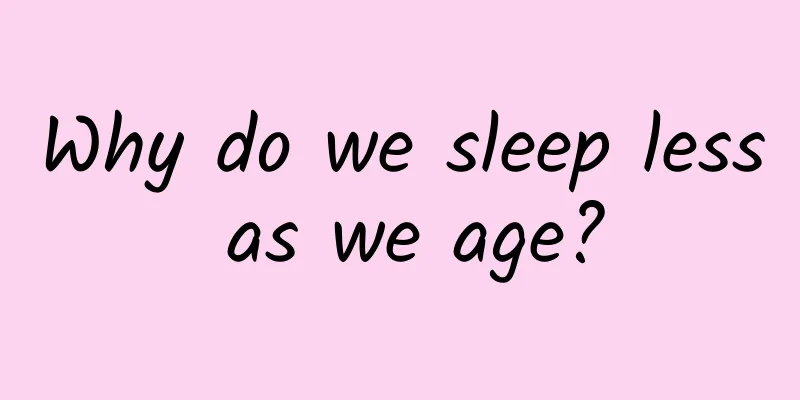Why do we sleep less as we age?

|
When our parents get older, they almost always have a common phenomenon: sleeping less and waking up early. The "China Sleep Research Report (2022)" shows that the average daily sleep duration of Chinese residents in 2021 was 7.06 hours, 42% of the elderly took more than half an hour to fall asleep, and the insomnia rate was as high as 21%. For most people, sleep cycles follow the changes in the sun. As daylight appears and temperatures rise, we wake up; as darkness falls, our core body temperature drops and our bodies produce a sleep-promoting hormone called melatonin, which makes us want to go to sleep. This daily pattern is called the circadian rhythm, which is the rhythm of the change of day and night. It is controlled by a master clock in the brain, the suprachiasmatic nucleus, which is located in the hypothalamus. It tells our body when to sleep, when to eat, and when to be most active based on clues such as light and temperature. It can actually be simply understood as a biological clock. Circadian rhythms change throughout our lives, reaching their latest bedtimes during the teenage years and then moving earlier as we age. Changes in circadian rhythms are a common cause of sleep problems in older adults. Copyright images in the gallery. Reprinting and using them may lead to copyright disputes. Why do people sleep less as they get older? Maybe it's because of these points Starting at age 60 to 65, circadian rhythms shift earlier, meaning older adults wake up earlier in the morning and feel sleepier earlier in the evening. These changes are gradual. Studies have shown that starting from middle age, the circadian rhythm advances by about half an hour every decade, that is, the time of falling asleep and waking up are also advanced. In other words, the biological clock of most elderly people needs to go to bed at 7 or 8 pm and wake up naturally at 3 or 4 am the next day. And as they age, older people are more sensitive to changes in their circadian rhythms, which can lead to restless sleep if they don't go to bed at a specific time. But many elderly people think that waking up too early in the morning is caused by sleeping too early, so they choose to go to bed a few hours later. Unfortunately, the biological clock will still send a wake-up signal around 3 a.m., causing sleep to be disturbed. This leads to a worse result - sleeping late but waking up early, affecting both sleep duration and sleep quality. Sleep consists of several stages: light sleep (N1), slightly deeper sleep (N2), deep sleep (N3), and rapid eye movement (REM) sleep. In terms of sleep quality, older people spend more time in light sleep and less time in deep sleep and REM sleep. Light sleep is not enough to rest, so the average older person wakes up three to four times a night. Compared with young people, the elderly wake up and fall asleep more suddenly, which makes them feel that they spend most of their time awake and feel that they did not get much sleep that night. Generally speaking, daytime naps are a common way to cope with sleep deprivation. However, daytime naps can also make it more difficult to fall asleep at night. They delay bedtime at night, setting the stage for another sleepless night - creating a vicious cycle. Daytime naps may make it harder to sleep at night Image source: AI generated by the author Overall, older adults get much less sleep on average than younger adults, with most getting only six and a half to seven hours of sleep per night, rather than the recommended seven to eight. Of course, older adults also seem to have a harder time adjusting to new sleep rhythms, so changing their schedules can be harder to manage. While it's normal to experience sleep problems as you age, severe changes in your circadian rhythm may be an early sign of Alzheimer's disease. Of course, in addition to circadian rhythm, there are other reasons that can affect sleep quality in old age: ① Health problems such as heart disease, arthritis, and sleep apnea can make it more difficult for older people to fall asleep and stay asleep. ② Certain medications that older people often take, such as antidepressants, blood pressure medications, and painkillers, may have a negative impact on their sleep. ③Many elderly people do not have enough sunlight exposure every day, usually only about one hour, and adequate sunlight exposure is very important for maintaining a normal biological clock. The older you get, the less you sleep It may be that light affects circadian rhythms Researchers are still unsure why circadian rhythms shift earlier with age, but are finding that it may be a combination of biological and environmental factors. Based on studies on mice, the researchers also suspect that the suprachiasmatic nucleus in humans may become weaker, leading to reduced circadian rhythm fluctuations. As a result, less melatonin is produced at night, and older people may experience a reduced distinction between sleep and wakefulness. This causes them to sleep less deeply at night, feel more sleepy during the day, and after catching up on sleep during the day, the quality of sleep in the middle of the night becomes worse, and so on, a vicious cycle. Copyright images in the gallery. Reprinting and using them may lead to copyright disputes. Because light plays such a critical role in regulating circadian rhythms, many studies have focused on how light exposure changes with age. Other studies have suggested that it may be that "aging" eyes are not letting in enough light, especially short-wavelength light, which is important for regulating circadian rhythms. It may also be due to less time outdoors and more time under weaker artificial light, which is not as effective in controlling our sleep cycles. Some people with cataracts have surgery to allow more light into the eyes, which seems to improve their sleep quality. For older people in nursing homes, they may spend less time in the sun and be less active. Long-term nursing home residents are disturbed by noise and light at night, especially if they share a room with others. Compared with non-residential elderly people, nursing home residents are more likely to suffer from poor sleep and may be drowsy throughout the day. As I get older, I feel less How to improve sleep? ① Establish regular sleeping habits: Going to bed and getting up at fixed times every day helps regulate your biological clock. ②Create a comfortable sleeping environment: Keep the bedroom dark, quiet and cool, and use a fan or a white noise machine. ③ Sunbathing during the day: If you want to sleep later, try not to be exposed to too much light in the morning hours. Instead, take a walk in the evening or bask in the "sunset" later in the day. This can help delay the release of melatonin and "trick" your body into delaying bedtime. ④ Limit daytime naps: If you need to take a nap, it should be limited to 20 to 30 minutes and should take place in the early afternoon. ⑤ Limit alcohol and caffeine: Alcohol and caffeine may reduce sleep quality and REM sleep. ⑥Consult a doctor: If sleep problems persist, you should consult a doctor to rule out or treat any underlying health problems, or adjust medications that may affect sleep. ⑦ Exercise appropriately: Appropriate physical activity can help improve sleep, such as walking, swimming, Tai Chi or yoga. It's very difficult to fight the body's natural tendency to sleep at a specific time, so the easiest way to get better sleep as you age may be to shift your sleep patterns earlier. By going to bed and waking up at the same time every day, you may be able to achieve deeper sleep. References [1] Fischer, Dorothee, et al. "Chronotypes in the US–influence of age and sex." PloSone12.6(2017):e0178782. [2]Duffy, Jeanne F., Kirsi-Marja Zitting, and Evan D. Chinoy. "Agingandcircadianrhythms." Sleepmedicineclinics10.4(2015):423-434.[3]Anderson, JohnAE,etal."Timing is everything:Agedifferencesinthecognitivecontrolnetworkaremodulatedbytimeofday."Psychologyandaging29.3(2014):648. [4] Cooke, Jana R., and Sonia Ancoli-Israel. "Normalandabnormalsleepintheelderly." Handbook of clinicalneurology 98 (2011): 653-665. [5] Li, Junxin, Michael V. Vitiello, and Nalaka S. Gooneratne. "Sleepinnormalaging." Sleepmedicineclinics17.2(2022):161-171. [6]Musiek,ErikS.,etal."Circadianrest-activitypatternchangesinagingandpreclinicalAlzheimerdisease."JAMAneurology75.5(2018):582-590.[7]Chen,Cho-Yi ,etal."Effectsofagingoncircadianpatternsofgeneexpressioninthehumanprefrontalcortex."ProceedingsoftheNationalAcademyofSciences113.1(2016):206-211. [8] Duffy, Jeanne F., Jamie M. Zeitzer, and Charles A. Czeisler. "Decreased sensitivity to phase-delaying effects of moderate intensity light in older subjects." Neurobiology of aging 28.5 (2007): 799-807. [9] Figueiro, Mariana G. "Light,sleepandcircadianrhythmsinolderadultswithAlzheimer'sdiseaseandrelateddementias." NeurodegenerativeDiseaseManagement7.2(2017):119-145. [10] Chellappa, Sarah L., etal. "Association of intraocular cataract lens replacement with circadianrhythms, cognitive function, and sleepinolderadults." JAMAophthalmology137.8 (2019): 878-885. Author: Denovo Science Team Reviewer: Li Jingjing Professor and Chief Physician, Department of Neurology, Beijing Tiantan Hospital |
Recommend
Can white jade be worn together with tourmaline? What is the function of tourmaline?
The mineralogical name of tourmaline is tourmalin...
My legs hurt after walking after the abortion.
Although pregnancy is a very happy thing, due to ...
How to tell a virgin by looking at her legs?
Nowadays, people's minds are more open, and m...
What is the reason for a high belly during pregnancy?
What women worry about most during pregnancy is t...
What causes amyloid cardiomyopathy? What are its manifestations on ultrasound?
Author: Wang Fang, Chief Physician, Beijing Hospi...
Can I have sex at 34 weeks of pregnancy?
Pregnant women are more sensitive during pregnanc...
What are the effects of being angry on a woman's body?
At present, many women have increased their work ...
How long should I take anti-inflammatory drugs after abortion?
Women's bodies will be inflamed after abortio...
[Fat Bear Science] It is a rumor that drinking coffee causes cancer, but these eating habits really should not become "habits", maybe you have them!
Previously, everyone was flooded with news about ...
What are the specific reasons for a pregnant woman's heart to beat faster?
As a patient, if you don’t even know the cause of...
Abortion methods
Although abortion is not a good thing, for many y...
Is leucorrhea cleanliness serious?
The secretion not only has the function of lubric...
In which month do bamboo shoots usually appear? Who should eat bamboo shoots?
Bamboo shoots are low in sugar and fat, and are a...
Treatment of invasive hydatidiform mole
The explanation of hydatidiform mole on the websi...
Very few menstruation, almost no
There are usually many factors that cause very in...









